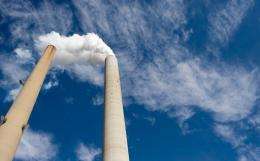Smoke stacks are pictured at a coal power plant in the US in 2009. An environmental monitor Tuesday identified 19 new sites across the United States where groundwater near coal-ash dumps from power plants was found to be contaminated with arsenic and other pollutants.
An environmental monitor Tuesday identified 19 new sites across the United States where groundwater near coal-ash dumps from power plants was found to be contaminated with arsenic and other pollutants.
The Environmental Integrity Project said the pollution -- in some cases more than 10 times the maximum contaminant level for arsenic -- is a direct health threat to thousands of residents who live near plants which use coal.
The findings in a report released by the nonprofit environmental group are the latest in a years-long face-off between environmental groups teaming up with residents against the energy industry, which EIP says is leaning on Congress to thwart efforts to regulate the dump sites.
"When you look, you find contamination," the report's main author, environmental consultant Russell Boulding, told reporters.
Jeff Stant, director of the EIP's Coal Combustion Waste Initiative, described the conditions as "a clear and present danger to America's public health."
While power plants smokestack emissions are regulated, environmentalists say laws are more lax on dumping of waste that can seep into groundwater.
The US Environmental Protection Agency (EPA) in 2007 had documented 67 potential damage cases.
The new findings show contamination, in addition to arsenic, from several other pollutants including lead, barium cadmium or boron at levels greater than the health advisories issued by EPA.
The study focuses in particular on coal-ash, a fine-grade, toxic residue of the coal combustion process and which is captured by filters before the material goes out the smoke stack. The ash must be disposed of or recycled.
Boulding said ash recycling like structural fill is "bogus" because it is disposing of toxins without environmental controls on the process.
One site, an urban rail trail in Indiana which uses recycled coal-ash, has soil contaminated with arsenic 900 times the federal screening level, the report said.
Many facilities store the ash in ponds, but the EIP says many are leaking into groundwater, and that firms often do little to prevent ash from blowing out of trucks and through nearby communities.
Thousands of citizens have pleaded for greater federal oversight and enforcement of existing standards.
"Do our lives matter to you?" they asked in an October letter urging lawmakers not to pass a pending bill that would deregulate coal-ash management and make it easier for companies to ignore cleanup standards.
"We know what it is like to suffer through the daily onslaught of blowing ash, drink water from faucets contaminated with ash leachate, and see our wetlands and creeks poisoned with toxic metals like arsenic.
Yma Smith of Labelle, Pennsylvania, lives just 300 yards (meters) from the Matt Canastrale coal-ash dump site.
She said 44 of Labelle's 244 people have died in the last five years, and several residents have cancer.
"It's time for us to think about the safety and wellness of the people, not greed," she said on an EIP-arranged conference call.
(c) 2011 AFP



















